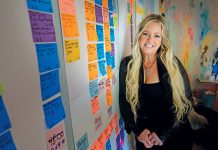Jenny Camacho moved to South Florida in December, hoping the
weather would be easier on her health than the frigid, snowy
winters of New York and looking forward to living closer to two of
her children.
Jenny Camacho moved to South Florida in December, hoping the weather would be easier on her health than the frigid, snowy winters of New York and looking forward to living closer to two of her children.
She had spent four years working as a cook at a senior center in Brooklyn, fine-tuning her skills at preparing meals for people with special dietary needs. Despite the recession, she thought she would find a job in a region known as a snowbird and senior roost.
Jobless six months later, she had run up debt on her credit cards, trying to preserve some of her savings and still make ends meet. Camacho rents an apartment in Sunrise, Fla., with her youngest daughter, Priscilla.
But Camacho, 51, recently met with counselors from Sunrise-based American Debt Counseling after hearing them speak at Workforce One, a Broward County employment office. Ever since, she has stretched her budget enough that she hasn’t used her credit cards since April.
“Right now there is no income. They teach you how to control your spending,” Camacho said.
In this economy, it’s difficult to think about boosting credit scores, building savings or erasing debt. But it’s not impossible – and the recession may be just the right boost someone at any income level needs to brighten their financial picture, said Barbara Stark, director of community development and education for American Debt Counseling.
Her nonprofit company and several others in South Florida offer free advice and help to people in need of credit counseling and money management.
“There’s always hope,” Stark said. “It’s not a question of how much money you have. It’s how you manage it.”
For example, she said, the true cost of using a credit card can be really scary – if you know what that true cost is. A $50 dinner charged on a card with an interest rate of 22 percent can cost $2,500 paid over 20 years, she said.
“Once they begin to see they’re not earning any more money, yet they’re living a better life, it makes sense,” she said. “You should get help before you really need it, so you don’t get into a dire situation.”
In Camacho’s case, things were pretty dire by the time she requested help, said Andrea Mitchell, a certified credit counselor.
Mitchell talked to Camacho’s creditors, who agreed to lower the interest rates on her debt – a service that Camacho is paying for. Mitchell has helped Camacho find occasional work, including baby-sitting. And she counseled Camacho to rely on her family.
“She helped them and now they’re reciprocating,” Mitchell said. Camacho’s son also lives in Broward. “Jenny is very much a survivor. She came to me wanting to survive. There’s no other word to describe her.”
In addition, Mitchell came up with a spending plan for Camacho – who was already spending little more than for basic necessities.
MAKE A SPENDING PLAN
Knowing what your monthly expenses are is key, said Ellen Siegel, a certified financial planner in Miami.
Figure out how much money is coming in from every source: a paycheck, child support, alimony, social service agencies.
Then figure out what’s going out – fixed expenses, such as rent and a car payment; variable expenses, necessary items that aren’t a set amount each month, such as food and medical bills; and discretionary spending, things you don’t need, but want, such as a vacation, movie tickets, birthday presents.
“Too many people have no idea whatsoever where their money is going every month,” Stark said.
Siegel, a member of the Financial Planning Association of Miami-Dade, is a volunteer with the group’s new Money 101 program, which offers services at the United Way of Miami-Dade’s new Center for Financial Stability in Hialeah.
She takes the idea of building a spending plan one step further.
“How do we get into trouble? Money’s not real,” Siegel said. It’s in the form of a credit card, debit card, check or bank balance.
Once a month, she cashes a check and puts the cash into different envelopes for the month’s expenses – gas, groceries, clothing, rent or mortgage payment, utilities and an emergency fund, a must for everyone, no matter their net worth.
“That’s a very, very powerful strategy,” Siegel said. It shows how far your money goes – or doesn’t.
CREDIT CARDS
When someone is in debt, it may be tempting to cut up credit cards so they can’t be used to accumulate more debt, Siegel said.
While that sounds like a good idea, those credit cards may be needed at some point.
Her suggestion: Put them in a plastic bag and put the bag in a cup of water. Put the whole thing in the freezer.
“If the car blows up and you have to use your credit card, you can,” she said. Any time the cards are needed, it will take patience to use them. They’ll have to be thawed – and slowly, since microwaving the frozen cards would melt them.
“You can’t just be hungry, angry, lonely or tired and go shopping.”
Building a good credit history and improving a credit score actually requires having some debt, or a history of paying off debt regularly, Stark said. And credit cards held for a long time are good for a credit score.
Although Camacho isn’t using her credit cards anymore, she’s still making payments each month.
“We got them to lower the interest rate so much so that she was able to make a minimum payment,” Mitchell said. It’s low, but not so low that Camacho will be paying off her debt forever. She should be able to pay off the debt she has now in five years or less.
One financial guru’s philosophy is to line up every bill in size order. Pay the minimum on every bill. Whatever money is left over should be used to pay off the smallest bill.
The advice isn’t typical – many financial planners would suggest putting more toward the bill with the highest interest rate, Siegel said, but faith-based financial expert Dave Ramsey’s method offers a sense of accomplishment.
LOOK AT CREDIT REPORT
Credit reports are free. But that doesn’t mean people are looking at them, said Angelo Gonzalez of Miami Saves, who is director of the Economic Independence Program at the nonprofit Cuban American National Council.
“We encourage people to look twice a year,” he said. “We’re lucky if they pull it once every five years.”
The only truly free reports – that don’t require signing up for any additional services – are at annualcreditreport.com. Beware of impostor sites that prey on people who misspell the website.
The reports don’t include scores, however. Those must be purchased.
The reason to look at the reports: Find errors, forgotten debts and fraud – and start fixing the problems, Gonzalez said.
That is, if you can tell what they are. “The other challenge is, have you ever looked at your credit report? It’s like reading Greek. A credit report is useless unless you know how to read it,” he said. “We’ll hold a workshop and go item by item.”
While all of his organization’s services are free, they can also pull credit reports – one from each bureau – for about $13.
SEARCH FOR SAVINGS
They also teach a variety of courses and offer suggestions on how to stretch a limited budget.
Some ideas are more obvious than others, he said, such as buying more fruits and vegetables and less meat and seafood to lower food bills.
Partnering with another family while shopping may also cut costs: Buy in volume at a wholesale store and divvy up the items.
“You end up saving a lot of money. People get that. That resonates more than putting $10 in a savings account,” he said.
Negotiate with everyone, Siegel said, even if you think someone won’t budge on the price.
“If there’s a doctor bill, if there’s a car bill, just ask. Say, ‘I need some consideration. What can you do for me?’ ” Siegel said. “The world is sympathetic now. Everybody is feeling it.”
FIND MORE INCOME
Consider renting out a room in your home – to someone you trust – to bring in more income, Gonzalez said, and be sure to have the renter sign a lease agreement.
And don’t think collecting unemployment means you can’t work, he said. The income must be declared, but if you can find suitable part-time work, take it. Camacho’s youngest daughter, Priscilla, 19, is working part-time and Camacho is willing to take any job, even if it doesn’t involve working in a kitchen.
Whatever someone’s situation, there’s a way out.
Linda Eads, founding principal of MAST Academy, recently created the Youth and Family Financial Literacy Institute in Miami-Dade. The nonprofit’s aim is to teach financial literacy in schools and families – and, she hopes, prevent some of the situations people have found themselves in during this recession.
“As I matured, I realized, ‘Wow, I can do so much more with this if I would budget even better,’ ” Eads said. “No matter how old you are, you can change your ways.”
Jenny Camacho agrees – although she said she doesn’t have the money to pay her bills beyond the end of June.
“Everything is going to come out OK. We’re going to survive with whatever we have,” she said. “Sometimes you struggle but something better comes out on the other side.”













